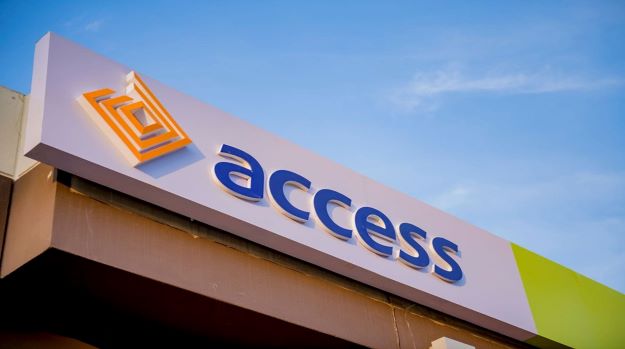E-Financial
Access Holdings Gets Regulatory Approval to Acquire Majority Stake in ARM Pensions

Access Holdings Plc has disclosed that Access Golf Nigeria Limited, a majority shareholder of Access Pensions Limited and a subsidiary of Access Holdings, has received the necessary regulatory clearances for its proposed acquisition of a majority equity stake in ARM Pensions Managers (PFA) Limited (ARM).

According to the statement, the National Pension Commission and the Federal Competition and Consumer Protection Commission have both granted their ‘no-objection’ and approval, respectively, for the transaction.
Subject to the receipt of relevant regulatory approvals, it is intended that following the acquisition, the operations of ARM and Access Pensions will be merged to create Nigeria’s second largest Pension Fund Administrator (PFA) by Assets Under Management.
Commenting on this transaction, Dr. Herbert Wigwe, the Group Chief Executive, of Access Holdings, said: “We are pleased to have reached this transformative milestone in our pension fund administration journey.
“The proposed combination of ARM Pension with Access Pensions will not only create sustainable stakeholder value but will also contribute positively to the growth and development of the pension industry. We anticipate an exciting future for the combined entity.”
Speaking on the transaction, the Group CEO of ARM Holding Company Limited Jumoke Ogundare, said: “The market in which we operate is ripe for consolidation and I am confident that the proposed combination will create a formidable pension funds administration business leveraging Access Group’s expansive distribution network and innovation culture to deliver sustainable value to stakeholders.”
The statement from the group noted that the completion of this transaction is contingent upon obtaining all requisite regulatory approvals. Access Holdings remains committed to keeping the market informed in line with its disclosure obligations.
It would be recalled that Access Holdings announced that its flagship subsidiary, Access Bank PLC (Access Bank) has entered into a definitive agreement with the Ugandan-based Finance Trust Bank (FTB) and its selling institutional shareholders for the acquisition of a majority equity stake in FTB.
This was contained in a notice to the Nigerian Exchange Limited, the investment public, and made available to the media.
The deal will also see Access Bank concurrently acquiring the shares currently held by FTB’s Institutional Shareholders who have sought to exit to a strategic, long-term shareholder.
According to a statement from the Group. the transaction is subject to regulatory approvals by the Central Bank of Nigeria and Bank of Uganda and is expected to close in the first half of 2024, following the fulfillment of customary conditions precedent. Following the anticipated closing of the transaction, Access Bank would own an estimated 80% shareholding in FTB.
It noted that coming at a time when commercial banks in Uganda are looking to increase their capital, this strategic acquisition presents an opportunity for Access Bank to partner with FTB and its stakeholders to create more significant opportunities for financial inclusion, product diversification, and, ultimately, greater customer-centricity.
Access Bank’s presence in over 20 countries globally presents a robust platform that FTB’s customers can leverage to boost trade opportunities with the rest of the world.
E-Financial
NDIC Says No Customer Loses Deposits in Failed Banks

Nigeria Insurance Deposit Corporation (NDIC) has guaranteed customers of insured commercial banks prompt recovery of their deposits in the event of risk liability or liquidation.

In addition, the corporation assured depositors of its statutory mandate, which includes supervising banks for risk assessment, ensuring ethical standards, and enhancing financial stability in the country.
Mrs Emily Osuji, executive director, Corporate Services, NDIC, gave the assurance during a Stakeholders Town Hall Meeting on customer protection regarding bank charges and deposits in Kano.
Mrs Osuji posited that the NDIC has, in recent times, demonstrated a strong commitment to protecting the hard-earned savings of Nigerians and sustaining confidence in the banking system.
She cited the cases of defunct Heritage Bank Limited, Union Homes Plc and Aso Savings and Loans Plc, where depositors received their deposits promptly after meeting the relevant requirements.
The NDIC boss, however, reminded customers to link their Bank Verification Number (BVN) as a unique identifier to locate their alternate accounts, where their claims will be transferred.
The executive director affirmed that NDIC has expanded coverage to protect about 99 per cent of depositors in Nigeria, a deliberate policy aimed at protecting small savers, promoting financial inclusion, and enhancing trust in the banking sector.
She said, “The corporation fulfils its role through its core mandates of deposit guarantee, bank supervision, distress resolution and bank liquidation, all of which are geared towards protecting the hard-earned savings of Nigerians and sustaining confidence in the banking system.
“Our strapline, ‘Protecting your bank deposits!’, is more than mere words for us. We stand by this statement as a firm commitment to our mandate of ensuring that depositors have access to their hard-earned savings in the event of bank failure.
“This is a critical responsibility that we do not take lightly. This is especially so in times of financial uncertainty and distress, with the NDIC standing as a pillar of safety and reassurance for depositors, particularly the most vulnerable.”
Speaking on the concept of stakeholder engagement, Hawwau Gambo, head of Communication and Public Affairs, said the corporation was compelled to provide clarity, build trust and strengthen depositor confidence amid misconceptions.
Gambo noted that the recent revocation of the operating licences of some banks by the Central Bank of Nigeria, (CBN) and the current public discourse on banks’ recapitalisation efforts have reinforced the need for sustained stakeholder engagement.
She reminded that sustained awareness is pertinent to dust, given already heightened public interest and featured public confidence in the financial institutions.
“NDIC’s last Public Awareness Survey highlighted the need to enhance interpersonal communication channels to improve public understanding of deposit insurance. It is against this backdrop that the Stakeholders’ Town Hall Meetings were conceived as a structured, interactive platform for dialogue, education and feedback,” Gambo noted.
E-Financial
CBN Expresses Concern Over Foreign Investments in Nigeria Fintechs

The Central Bank of Nigeria in its 2025 Fintech Policy Insight Report, has raised concern over Nigeria’s fintech sector heavily dependent on foreign investment, exposing it to swings in global markets.

The report said the sector has shown resilience despite global economic pressures, but warned that reliance on external capital leaves it vulnerable to market fluctuations.
It would be recalled that startups in the country raised $520m in equity funding in 2024, down from about $747m in 2019, when Nigeria captured roughly 37 per cent of all African startup investment.
This performance, amid significant global macroeconomic gyrations, underscores Nigeria’s position as a key hub for financial innovation. The sharp rise in interest rates in advanced economies during 2022 contributed to a slowdown in venture capital funding.
“These dynamics highlight the importance of developing domestic funding avenues, such as leveraging Nigeria’s capital markets, to reduce currency risk and sustain fintech growth,” the apex bank stated.
Olayemi Cardoso, CBN Governor, said Nigeria is undergoing a rapid and significant financial evolution. Over the past decade, the nation’s fintech landscape has grown from a handful of startups into one of Africa’s most vibrant innovation ecosystems.
“Even amid global economic headwinds, Nigerian fintech firms continued to attract investment and drive change. Today, with improved stability of our currency and domestic economy, it is clearer than ever that financial innovation can advance inclusion at scale,” the executive commented on the report.
In addition to funding, the central bank underscored Nigeria’s continued leadership in digital financial infrastructure. More than 25 per cent of all electronic transactions in Africa’s most populous nation are processed via real-time payment channels, with close to 11 billion transactions processed in 2024, up from five billion in 2022. The report described Nigeria’s instant payments platform, NIBSS NIP, as among the most mature and widely adopted globally.
The report also mentioned the need to strengthen system integrity and reputation, pointing to compliance reforms, anti-money laundering supervision, and consumer protection measures as key priorities for sustaining investor confidence.
By focusing on domestic funding, regulatory modernisation, and innovation infrastructure, the CBN aims to position Nigeria not only as a fintech front-runner but also as a rule-setter whose regulatory lessons are relevant to peer emerging and high-growth economies globally, the central bank said.
Stakeholders surveyed by the CBN also cited compliance costs as a significant challenge to innovation. According to the report, 87.5 per cent of respondents said that the cost of meeting regulatory and risk requirements significantly impacts their capacity to innovate, while delays in product approvals and regulatory timelines also remain major bottlenecks.
The report noted that 62.5 per cent of fintech firms plan to expand regionally, and there is strong support for regulatory pass-porting frameworks to enable compliant expansion into other African markets. However, the CBN warns that such cross-border growth requires a stable funding base and coordinated regulation.
E-Financial
UBA’s Easy and Instant Account Opening Thrills Returnee

After a few years abroad, I returned to Nigeria and faced a dilemma. Let me tell you all about it.

UBA
A few days ago, I was dragging my luggage through Murtala Muhammed International Airport. Everything felt bright and beautiful. Not necessarily in aesthetics, but in the vibrant colours, sounds, and energy all around. After three intensive years in the UK, I was finally back home. Ready for the hustle and bustle of Lagos life, and yes, the comfort of my parents’ home.
The plan was simple. Settle down and get my life on track. I’d sorted the job, and I had my person. But then came my dilemma. Money!. This doesn’t mean I was short of it or had too much of it. The real issue is where to actually keep and manage it in this country with daily dramatic happenings. With just two weeks left before I resumed at my new workplace, I had no time for long queues, endless paperwork, or the classic “Nigeria bank stress.” So, I needed an account, and I needed it fast.
So I turned to my best friend, Google, and typed, “Instant account opening in Nigeria.”
In less than a second, I was redirected to the United Bank for Africa instant account opening portal. A few taps later, and I had a fully functional account. Just like that. I could receive my funds, transfer my funds, and start building my financial life here again.
In less than a second, I was redirected to the United Bank for Africa instant account opening portal. A few taps later, and I had a fully functional account. Just like that. I could receive my funds, transfer my funds, and start building my financial life here again. Talk about ease, and this beautiful experience truly exemplified that definition
I was genuinely amazed. It felt too easy, almost suspiciously easy. But it was real, I mean, really soft like they were just thinking all about me while developing this new feature.
If you’re like me and pressed for time, avoiding unnecessary stress, or just ready to sort your finances without the hassle, consider this your sign.
UBA’s instant account opening is a game-changer. No queues to cut into your precious time. Just you and your phone, minutes away from being banked.
Get started here: https://aop.ubagroup.com
Trust me, if I could do it between unpacking and settling in, you can do it too. Your future self will thank you.

 Telecom3 days ago
Telecom3 days agoNCC Committed to Regional Digital Integration – Maida

 General News3 days ago
General News3 days agoIndigenous Firm Deploys 400,000 Smart Electricity Meters in 2025

 E-Financial3 days ago
E-Financial3 days agoCBN Expresses Concern Over Foreign Investments in Nigeria Fintechs

 E-Financial3 days ago
E-Financial3 days agoBOI Secures CBN Nod for Sharia Banking, Unlocks Ethical Funding Boom

 Telecom3 days ago
Telecom3 days agoITU Top Director Visits NITDA, Boosts Nigeria’s Digital Literacy Push

 E-Financial3 days ago
E-Financial3 days agoUBA’s Easy and Instant Account Opening Thrills Returnee

 News3 days ago
News3 days agoEFInA Unveils Research Fellowship Programme to Deepen Financial Inclusion Impact

 Telecom2 days ago
Telecom2 days agoSafer Internet Day: Sophos Warns – 42% Attacks Hit Stolen Logins in 2025



























